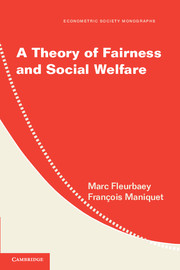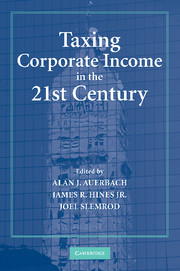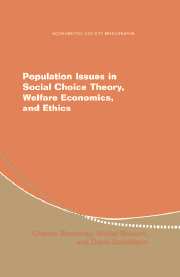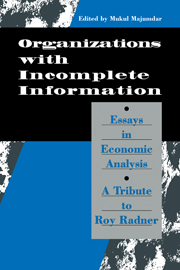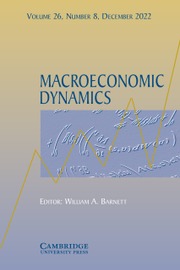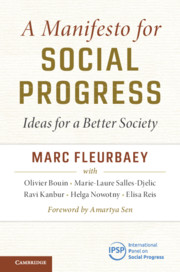A Theory of Fairness and Social Welfare
Part of Econometric Society Monographs
- Authors:
- Marc Fleurbaey, Université de Paris V
- François Maniquet, Université Catholique de Louvain, Belgium
- Date Published: June 2011
- availability: Available
- format: Paperback
- isbn: 9780521715348
Paperback
Other available formats:
Hardback, eBook
Looking for an inspection copy?
This title is not currently available for inspection. However, if you are interested in the title for your course we can consider offering an inspection copy. To register your interest please contact [email protected] providing details of the course you are teaching.
-
The definition and measurement of social welfare have been a vexed issue for the past century. This book makes a constructive, easily applicable proposal and suggests how to evaluate the economic situation of a society in a way that gives priority to the worse-off and that respects each individual's preferences over his or her own consumption, work, leisure and so on. This approach resonates with the current concern to go 'beyond the GDP' in the measurement of social progress. Compared to technical studies in welfare economics, this book emphasizes constructive results rather than paradoxes and impossibilities, and shows how one can start from basic principles of efficiency and fairness and end up with concrete evaluations of policies. Compared to more philosophical treatments of social justice, this book is more precise about the definition of social welfare and reaches conclusions about concrete policies and institutions only after a rigorous derivation from clearly stated principles.
Read more- Proposes precise definitions of social welfare not in abstract but concretely, for distribution of commodities, production of public/private goods, and tax redistribution of income
- Offers a way to think about social justice in economic models and make evaluations of concrete policies, rigorously based on basic principles of efficiency and fairness
- Links three domains of economics which have remained separated so far: public economics, social choice theory and theory of fair allocation
Reviews & endorsements
'Fleurbaey and Maniquet are among the outstanding scholars in the development of formal theories of social choice and justice today. Their many original contributions and synthesis, in the present volume, are masterly and go well beyond what can be said in the usual philosophical language. The concepts of fair and efficient resource allocations have been enriched by their work.' Kenneth J. Arrow, Stanford University and Nobel Laureate in Economics
See more reviews'In this monograph Marc Fleurbaey and François Maniquet, two major representatives of a modern Franco-Belgian school of social choice, systematically set out a new approach to social choice based on concepts such as fairness and resource equality. It should interest not just economists and social choice theorists, but also philosophers who agree with the argument that social justice is a matter of allocating resources rather than subjective satisfaction or happiness.' Peter J. Hammond, University of Warwick
'Theoretical attempts to aggregate individual preferences into a measure of social welfare have been plagued by negative results, including Arrow's famous theorem. Yet, in this important book, Fleurbaey and Maniquet show that an attractive theory of aggregation is possible if one relaxes Arrow's independence axiom in a natural way. The approach is rigorous yet conceptually simple enough to be usable in practice.' Eric S. Maskin, Institute for Advanced Study, Princeton and Nobel Laureate in Economics
'Fleurbaey and Maniquet's axiomatic synthesis of social welfare a la Arrow, and justice as equality of resources, is deeply original and entirely rigorous. Preserving the normative preeminence of efficiency and giving precedence to equal opportunity over informational parsimony, they construct a dazzling array of concrete allocation mechanisms, from income taxation to the fair division of indivisible commodities, and the provision of public goods. This brilliant book turns welfare economics into a powerful deconstruction of the social justice dilemmas.' Hervé Moulin, Rice University
'Marc Fleurbaey and François Maniquet's book constitutes an outstanding contribution, suitable (and highly recommended) for the broad audience of mainstream economists and policy makers alike, and a 'must read' for those with a taste for normative economics. One can only wish that books like this one get published more often.' Journal of Economic Inequality
Customer reviews
Not yet reviewed
Be the first to review
Review was not posted due to profanity
×Product details
- Date Published: June 2011
- format: Paperback
- isbn: 9780521715348
- length: 414 pages
- dimensions: 226 x 152 x 20 mm
- weight: 0.44kg
- contains: 89 b/w illus. 6 tables
- availability: Available
Table of Contents
Preface
Introduction
Part I. Basics:
1. A contribution to welfare economics
2. Efficiency versus equality
3. Priority to the worst-off
4. The informational basis of social orderings
Part II. Distribution:
5. Fair distribution of divisible goods: two approaches
6. Specific domains
7. Extensions
Part III. Production:
8. Public good
9. Private good
10. Unequal skills
11. Income taxation
Conclusions
Proofs.Instructors have used or reviewed this title for the following courses
- Philosophy of social sicences
- Seminar in Ethics
Sorry, this resource is locked
Please register or sign in to request access. If you are having problems accessing these resources please email [email protected]
Register Sign in» Proceed
You are now leaving the Cambridge University Press website. Your eBook purchase and download will be completed by our partner www.ebooks.com. Please see the permission section of the www.ebooks.com catalogue page for details of the print & copy limits on our eBooks.
Continue ×Are you sure you want to delete your account?
This cannot be undone.
Thank you for your feedback which will help us improve our service.
If you requested a response, we will make sure to get back to you shortly.
×
